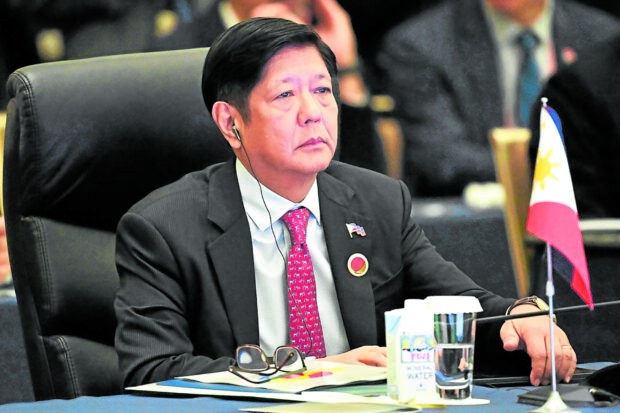Marcos: PH needs ‘paradigm shift’ in dealing with sea row
TOKYO, Japan — President Ferdinand Marcos Jr. said a “paradigm shift” was needed in how the Philippines approaches its maritime dispute with China, noting that diplomatic efforts with Beijing were headed “in a poor direction” and showing “very little progress.”
“It’s time that the countries that feel that they have an involvement in this situation, we have to come up with a paradigm shift,” Marcos said in a Dec. 16 interview with Mainichi Shimbun, parts of which were released by Malacañang in a statement on Tuesday.
In Beijing, the Ministry of Foreign Affairs warned that “the Philippines’ own interests and the region’s peace and stability… will take the toll” if Manila would continue engaging in a “blame game” and getting another country involved in the South China Sea issue.
“We hope the Philippines will realize that tying itself to some major power and forcing China to back down on issues concerning China’s core interests will lead nowhere. Ultimately, it is the Philippines’ own interests and the region’s peace and stability that will take the toll,” said the ministry’s spokesperson, Wang Wenbin.
“No matter what smokescreen the Philippines uses and what blame game it plays, nothing will change those facts,” Wang said in a press briefing on Monday.
Moving the needle
Marcos admitted that confrontations in the disputed waters had fallen into a pattern, with the Philippines engaging in traditional methods of diplomacy after each incident by sending a note verbale and the country’s embassy sending a démarche or protest to the Chinese foreign ministry.
“We have been doing this for many years now, with very little progress,” said the President, who was in Japan for Tokyo’s commemorative summit with the Association of Southeast Asian Nations (Asean).
“We have to do something what we have not done before. We have to come up with a new concept, a new principle, a new idea so that we move, as I say, we move the needle the other way. It’s going up, let’s move the needle back, so that paradigm shift is something that we have to formulate,” he added.
He said the Philippines would continue talking to its partners and come up with a joint position stating their responsibilities as far as the West Philippine Sea is concerned.
The West Philippine Sea refers to that part of the South China Sea that is within the exclusive economic zone of the Philippines.
Open door to dialogue
Last week, Manila and Beijing traded accusations over a ship collision near a disputed shoal in the South China Sea as tensions over claims in the vital waterway escalated.
China’s foreign ministry said the recent incidents were “entirely caused” by the Philippines but that maritime disputes did not depict the “whole story” of both nation’s relations.
Wang said China was willing to properly manage differences through dialogue and consultation.
“We will not close the door to dialogue and contact with the Philippines,” he said when asked about Mr. Marcos’ comments.
In addition to the Philippines, Asean members Vietnam, Malaysia, and Brunei have overlapping claims with China in parts of the South China Sea, a conduit for more than $3 trillion of annual shipborne commerce.
The Permanent Court of Arbitration in 2016 said China’s claims had no legal basis, a ruling the United States supports but Beijing rejects.
‘Just doing his job’
According to Wang, “the Philippines, bolstered by external support, has brushed aside China’s goodwill and restraint and repeatedly challenged China’s principles and red line. This is the major risk that could drive up tensions at sea.”
The Chinese official was fielding questions on Manila’s expanding naval cooperation between the United States and Japan and their planned trilateral patrols in the South China Sea.
Also on Tuesday, the Chinese Embassy in Manila defended its ambassador, Huang Xilian, amid recent calls from some senators to have him expelled over the China Coast Guard’s fresh acts of aggression against Philippine vessels.
“Ambassador Huang is actively working to improve China-Philippines relations. [We] hope that next year, the bilateral relations will bring more benefits to our two peoples,” the embassy said in a message to reporters.
On Sunday, the President said that while he was “upset” with Huang’s remarks on the recent incidents, he saw no reason to have him removed for “just doing his job” and “continuing to state the Chinese narrative.”
“Because the truth of the matter is, the next ambassador will say the same thing because that’s China’s line,” Mr. Marcos said. “That’s why we have to work around it.”
—WITH REPORTS FROM NESTOR CORRALES AND REUTERS INQ
For comprehensive coverage, in-depth analysis, visit our special page for West Philippine Sea updates. Stay informed with articles, videos, and expert opinions.
